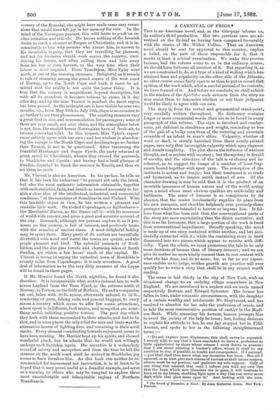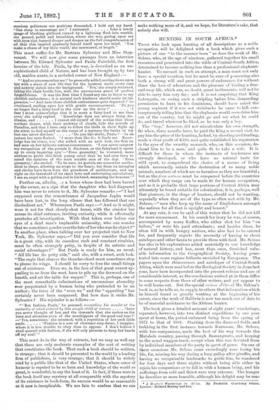A CARNIVAL OF PRIGS.*
Tars is an American novel, and, as the title-page informs us, its author's third production. Her two previous ones are ad- vertised on the fly-leaf as having been compared favourably- with the stories of Mr. Wilkie Collins. That an American
novel should be sent for approval to this country, implies a belief, on the part of those responsible for it, that it merits at least a critical examination. We make this proviso because, had the volume come to us in the ordinary course,. we should have forborne all mention of it. But regarding it, as we are constrained to do, as a type of a kind of writing which has attained fame and popularity on the other side of the Atlantie,t1 no other course seems fairly open to us than to put on record that' opidion of the work which, after a careful perusal of its contents;;
we have formed of it. And before we conclude, we shall submit, to the readers of the Spectator such extracts from the story as, may assist them to determine whether or not their judgment, would be likely to agree with our own.
The story is, from the verbal and grammatical stand-point,. very carefully written throughout. No dictionary contains. longer or more ornamental words than are to be found in every- paragraph of this volume. The style is involved and cumber- some, yet deficient in steadiness and weight, reminding us less: of the gait of a bulky man than of the tottering and uncertain scramble of an infant in man's attire. Vulgarity, whether of word or deed, is sternly banished from these neatly-printed' pages, save only that incorrigible vulgarity which apes elegance• and dreads simplicity. The plot shows the influence of anxious thought, and is replete with mystery ; but the mystery is devoid: of novelty, and the structure of the tale is so clumsy and in- coherent, as to suggest the image of a number of loose frag- ments bound together with spun yarn. The conception of the incidents is ardent and tragic ; but their treatment is so crude and hysterical, as to inspire mirth instead of awe. Of the character-drawing it may be said that it is the product of an incurable ignorance of human nature and of the world, acting upon a mind whose most obvious qualities are artificiality and' feebleness. The sense of humour is so conspicuous by its' absence, that the reader involuntarily supplies its place from• his own resources, and chuckles helplessly over precisely those passages which are intended to harrow or impress him. It fol- lows from what has been said that the conversational parts of the story are more excruciating than the direct narrative ; and this is so far fortunate, that a large portion of the work is freed from conversational impediment. Broadly speaking, the novel is made up of one story contained within another, and but acci- dentally connected with it ; while the containing story is itself dissevered into two pieces, which appear to reunite with diffi- culty. Upon the whole, we must pronounce the tale to be only more destitute of human than of literary interest ; and we can give its author no more kindly counsel than to rest content with what she has done, and do no more; for, so far as our experi- ence enables us to judge, neither growth nor practice will ever qualify her to write a story that shall be in any respect worth reading.
The scene is. laid chiefly in the city of New York, with an occasional change to an outlying village somewhere in New England. We are introduced to a nephew and an uncle named respectively Bertram and Edward Sylvester. The former has fallen in love, under romantic circumstances, with the daughter of a certain wealthy and aristocratic Mr. Stuyvesant, and has resolved to abandon for her sake the profession of music, and to take the more remunerative position of cashier in the Madi- son Bank. While amassing his fortune, honour prompts him to avoid the society of the lady he loves ; bet, feeling desirous to explain his attitude to her, he one day stopped her in Fifth Avenue, and spoke to her in the following straightforward' terms :—
" 'Do not express your displeasure, this shall never be repeated. I merely wish to say that I have concluded to leave a profession so little appreciated by those whose esteem I most desire to possess; that I am about entering a banker's office, where it shall be my ambition to rise, if possible, to wealth and consequence. If I succeed,. —yon shall shall then know what my incentive has been. But till I succeed, or at least give such tokens of success as shall insure respect, silence must be my portion, and patience my sole support. Only of one thing rest assured, that until I inform you with my own lips that the hope which now illumines me is gone, it will continue to barn on in my breast, shedding light upon a way that can never seem dark while that glow rests upon it.' And bowing with the cere- • The Sword of Damocles: a Novel. By Anna Katherine Green. New York L Putnam.
monions politeness our positions demanded, I held out my hand. One clasp to encourage me !' I entreated Like a lovely image of blushing girlhood, turned by a lightning flash into marble, she paused, pallid and breathless, where she was, gazing upon me with eyes that burned deeper and deeper as the full comprehension of all that this implied gradually forced itself upon her mind. You make a chaos of mylittle world,' she murmured, at length."
This must suffice for Mr. Bertram Sylvester and Miss Stuy- vesant. We will now give some passages from an interview between Mr. Edward Sylvester and Paula Fairchild, the first heroine of the tale. Paula, by the way, is described as an un- sophisticated child of Nature, and has been brought up by two old, maiden aunts, in a secluded corner of New England :—
"'And so you remember me ?' he presently added, smiling down upon her with a sense of new life that for the moment made every care and anxiety shrink into the background. Yes,' she simply returned, faking the chair beside him, with the unconscious grace of perfect forgetfulness. It was the first time I found any one to listen to my childish enthusiasm ; it is natural such kindness should make its im- pression.'—' And have those childish enthusiasms quite departed ?' he continued, smiling upon her with gentle encouragement. Do you no longer find a fairy-land in the view up the river ?' I fear I must acknowledge that it is more a fairy-land to me than
ever,' she softly replied. Knowledge does not always bring dis- illusion, and I cannot rid myself of the notion that those verdant slopes, with their archway of clouds, hide the portals of Paradise, and that I have only to follow the birds in their flight up the river, to find myself on the verge of a mystery the banks at my feet can never disclose! `Do you like study, Paula r—In an instant her eyes flashed. I more than like it ; it feeds me. Know- ledge has its vistas, too,' she added, with an arch look, the first he had seen on her hitherto serious countenance. I can never outgrow my recognition of the portals it discloses, or the fairyland it opens up to every inquiring eye.'—' Even geometry,' he ventured, more anxious to probe this fresh young mind than he had ever been to sound the opinions of the most notable men of the day. Even geometry,' she smiled. To be sure, its portals are somewhat metho- dical in shape, allowing no scope to the fancy, but from its triangles and circles have been born the grandeurs of architecture, and up- right on the threshold of its exact laws and undeviating calculations, I see an angel with a golden rod in his hand, measuring the heavens.' "
Further on, alluding, .3 a house whose door had been barred by the owner, as a sign that the daughter who had disgraced
him was never to return to it, Mr. Sylvester remarks :—" I had supposed even the remembrance of Jacqueline Japha would
have been lost, in the long silence that has followed that one disobedient act." Whereupon Paula says :—" And so it might, were it not for that closely-shut house, with the sinister bar across its chief entrance, inviting curiosity, while it effectually
precludes all investigation. With that token ever before our eyes of a dead man's implacable animosity, who can wonder that we sometimes ponder over the fate of her who was its object ?" In another place, when talking over her projected visit to New York, Mr. Sylvester says,—" Did you ever consider that life in a great city, with its ceaseless rush and constant rivalries, must be often strangely petty, in despite of its artistic and social advantages ?" But Paula is ready for him, as usual.
"All life has its petty side," said she, with a sweet, arch look. "The eagle that cleaves the thunder-cloud must sometimes stop to plume its wings. I should be sorry to lose the small things out of existence. Even we, in the face of that great sunset ap- pealing to us from the west, have to pile up the firewood on the hearth, and set the table for supper." This is, perhaps, one of the most remarkable culminations of unconscious absurdity ever perpetrated by a human being who pretended to be an author ; the force of the "even we " and the" appealing" has certainly never been surpassed. But how does it strike Mr.
Sylvester ? His rejoinder is as follows :-
"' Bat fashion, Paula,' he pursued, concealing his wonder at the
maturity of mind evinced by this simple child of nature 'have you never thought of her, and the demands that she makes on the time and attention even of the worshippers of the good and true ?' —` Yes, sometimes,' she returned, with a repetition of her arch little
smile 'Fashion is a sort of obstinate step-dame, I imagine, whom it is less trouble to obey than to oppose. I don't believe I shall quarrel with fashion, if she will only promise to keep her hands off my soul.' "
This must do in the way of extracts, but we may as well say that these are only moderate examples of the sort of writing that constitutes the book. That such a book should be written, is strange ; that it should be presented to the world by a leading firm of publishers, is very strange; that it should be widely read by a public like that of the United States, where sense of humour is reputed to be so keen and knowledge of the world so great, is wonderful, to say the least of it. In fact, if there were in the book itself any mystery at all comparable with the mystery of its existence in book-form, its success would be as reasonable as it now is inexplicable. We are fain to confess that we can make nothing more of it, and we hope, for literature's sake, that nobody else will.



































 Previous page
Previous page